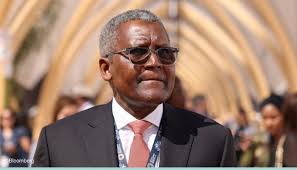The President of Dangote Industries Limited (DIL), Aliko Dangote, has said that his company is preparing to begin massive exportation of fertiliser, coal, polypropylene, and refined petroleum products in the next two years. According to him, this expansion will bring in about $6.5 million to $7 million every day to Nigeria and make Dangote Industries the largest source of foreign exchange earnings for the country.
Dangote made this statement on Monday, during a courtesy visit to the headquarters of the Nigerian Ports Authority (NPA) in Marina, Lagos. The business mogul stressed that the export of 16,000 tonnes of fertiliser daily is expected to significantly boost the country’s economy. “In the next two years, we will be exporting about 16,000 tonnes of fertiliser. That’s around $6.5 million to $7 million in daily revenue coming into Nigeria. This will make us the main supplier of foreign exchange for the country,” he said.
He also revealed that Dangote Industries will begin the exportation of coal within the coming weeks. In addition, the refinery located in the Lekki Free Trade Zone will be exporting no less than 25 million tonnes of different petroleum products annually. Furthermore, the company plans to export 600,000 to 700,000 metric tonnes of polypropylene, a key material used in plastics and packaging.
Dangote emphasized the importance of collaboration between Dangote Industries and the Nigerian Ports Authority to support the growth of the Marine and Blue Economy sector. He said the cooperation is key to expanding Nigeria’s export operations and making the ports more efficient. “As the biggest customer of the NPA, we believe in continuous engagement. We discussed many important matters, including how to deepen the Marine and Blue Economy sector, and we agreed to work together for Nigeria’s benefit,” Dangote said.
He also gave more details about the scale of operations at the Lekki port, stating that about 240 ships carrying crude oil will be used annually, with each ship carrying one million barrels. In addition, about 600 ships will be used to move refined products, and eight ships will be dedicated to fertiliser. “This kind of operation has never been witnessed before in Nigeria,” he stated.
Dangote highlighted that without strong support from the NPA, his company’s operations could suffer setbacks. “If the NPA does not provide us with the services we need, our operations will sink. That’s why they need more backing from the Federal Government. They need more equipment, tug boats, and proper facilities to handle this level of export,” he added. He promised to help ensure the NPA gets the required assistance from relevant government bodies.
He also disclosed that Dangote Cement is already being exported from Nigeria, with a full cement export plant having a six million ton capacity. According to him, Nigerian port activities will likely double in the next one to two years because of these developments.
The Managing Director of the Nigerian Ports Authority, Dr. Abubakar Dantsoho, said Dangote visited to show appreciation for the Federal Government’s “Naira for Crude” policy, which allows companies to pay for crude oil in naira through a One-Stop-Shop platform managed by the NPA. Dantsoho said this policy has greatly improved transaction efficiency across government agencies since it started in October 2024.
He revealed that the agency has been handling an average of 57 vessels per month since the policy was introduced, which exceeds Dangote’s projected 600 vessels per year. “This shows that we are already performing above expectations. If all government agencies can work together through a unified system, it will lead to improvements across different sectors of the economy,” he stated.
Dantsoho also said the Federal Government has approved the National Single Window, a digital platform to ease port operations. He added that the NPA is 95% ready to launch the Port Community System, which will further streamline port logistics and operations.
On port infrastructure, Dantsoho explained the two methods for port expansion: brownfield (renovating existing ports) and greenfield (building new ports). He pointed out that the last time a new port was built in Nigeria was in 1977, when Tincan Island Port was constructed. He disclosed that government has already approved the modernisation of both Tincan and Apapa ports, and construction is expected to begin in the third quarter of this year.
This partnership between Dangote Industries and the Nigerian Ports Authority is expected to strengthen Nigeria’s position in the global export market and boost foreign earnings while modernising the country’s port infrastructure.
